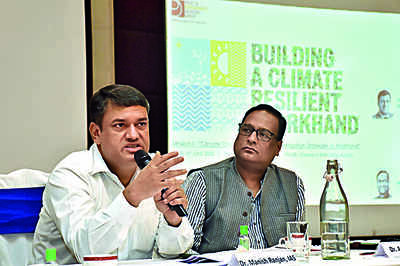- News
- City News
- ranchi News
- ‘Climate change mitigation plans need of the hour’
‘Climate change mitigation plans need of the hour’

Ranchi: Asar, a not-for-profit group working in rural development and policy & development advisory group (PDAG) organised a discussion on ‘Building a Climate Resilient Jharkhand’ here on Saturday to strategise a possible policy roadmap for a ‘Just Transition’ to renewable energy sources.
The discussion focused on the sixth assessment report of the Intergovernmental Panel on Climate Change (IPCC) and its findings for Jharkhand, which is home to a large number of tribals that relies primarily on agriculture. The necessity to integrate climate change adaptation and mitigation plans for states in the national policy discourse was also underlined.
Speaking on the occasion, state secretary for rural development, Manish Ranjan, said climate change has severely impacted livelihood, water resources and air quality. He highlighted the role of the state government in mitigating climate change and stated how the ‘Birsa Harit Gram Yojana’ is prepared for the dual aim of generating economic benefits and contributing to the environment through timber and non-timber plantation.
“Climate change has its severe impact on the productivity of crops while also impacting the water ecosystem. Now, it is high time to implement the government’s policies and programme related to climate resilience that bring benefits to underprivileged individuals. It is necessary to monitor whether the vulnerable populations are receiving benefits from the policies and programme at the ground level,” Ranjan said.
Anjal Prakash, the research director of BIPP (ISB) Hyderabad drew everyone’s attention to play a role to mitigate the effects of climate change. “Every individual needs to become climate resilient for which planning and integration are important. The need is to leverage local knowledge through co-creation from work and interactions at the ground level. This will help build research that supports action and implementation of a climate change-resilient Jharkhand,” he said.
Ramesh Sharan, the director of the Institute of Human Development, emphasized on understanding the application and use of renewable sources of energy for local use. “For sustainable development, power decentralization is crucial. Power should be shared with gram sabhas and panchayats,” said Sharan while talking about access to renewable energy.
The discussion focused on the sixth assessment report of the Intergovernmental Panel on Climate Change (IPCC) and its findings for Jharkhand, which is home to a large number of tribals that relies primarily on agriculture. The necessity to integrate climate change adaptation and mitigation plans for states in the national policy discourse was also underlined.
Speaking on the occasion, state secretary for rural development, Manish Ranjan, said climate change has severely impacted livelihood, water resources and air quality. He highlighted the role of the state government in mitigating climate change and stated how the ‘Birsa Harit Gram Yojana’ is prepared for the dual aim of generating economic benefits and contributing to the environment through timber and non-timber plantation.
“Climate change has its severe impact on the productivity of crops while also impacting the water ecosystem. Now, it is high time to implement the government’s policies and programme related to climate resilience that bring benefits to underprivileged individuals. It is necessary to monitor whether the vulnerable populations are receiving benefits from the policies and programme at the ground level,” Ranjan said.
Anjal Prakash, the research director of BIPP (ISB) Hyderabad drew everyone’s attention to play a role to mitigate the effects of climate change. “Every individual needs to become climate resilient for which planning and integration are important. The need is to leverage local knowledge through co-creation from work and interactions at the ground level. This will help build research that supports action and implementation of a climate change-resilient Jharkhand,” he said.
Ramesh Sharan, the director of the Institute of Human Development, emphasized on understanding the application and use of renewable sources of energy for local use. “For sustainable development, power decentralization is crucial. Power should be shared with gram sabhas and panchayats,” said Sharan while talking about access to renewable energy.
FOLLOW US ON SOCIAL MEDIA
FacebookTwitterInstagramKOO APPYOUTUBE
Looking for Something?

Start a Conversation
end of article
Visual Stories
Quick Links
UP NewsDelhi TemperatureChennai WeatherBangalore TemperatureSidhu Moose WalaCoronavirus in DelhiRTPCR test in GurgaonHyderabad RainPollution level in BangaloreDelhi SmogDelhi TemperatureNoida AQIGurgaon AQI todayFire in MumbaiMumbai RainsCovid 19 RT PCR Test in NoidaDelhi AQI todaySrinagar encounter

